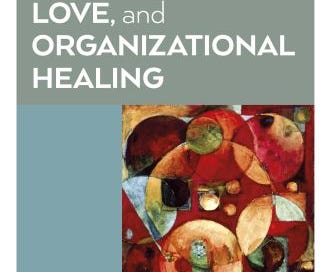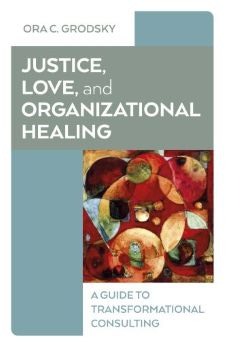POP your meetings: purpose, outcome, and process
And thoughts on power, transformation, and the value of listening with organizational consultant Ora Grodsky
In this month’s edition of “My friend wrote a book”… Organizational development consultant Ora Grodsky set out to celebrate twenty years of her consulting career by writing down twenty lessons learned, and then kept on writing. Her book, Justice, Love, and Organizational Healing: A Guide to Transformational Consulting, contains so many gems to help us practice positive conflict and dialogue in our work and personal lives.
The following is a condensed and edited interview with Ora. Read on to learn about the different kinds of power, and how to create meaningful meetings using POP.
Creating containers for dialogue and change
PO: Tell us about your consulting practice. What makes people reach out to you, and how do they know when to call you in?
OG: I am an external consultant (some people are internal). My clients call me in when there is some kind of pain or disharmony, or aspiration, that they need help with.
In my consulting work, I don’t give expert advice or tell people what to do. I build, together with my clients, containers within which they can discover what is true about where they are now, where they want be that’s different from where they are, and what they need to do to get there.
Often the process itself, thinking and dreaming together, changes the nature of how the work is done inside the organization.
The chair of the board of GE once said a person’s ability to be successful is directly proportional to their ability to ask for help. I think it’s wise for people to know that you can’t be, as Ron Heifetz says, on the balcony and on the dance floor at the same time. When we’re involved in something and very invested in an outcome, we can’t see how to hold process.
“Power with”: a humanist alternative to dominant and authoritarian power
In a chapter titled “We shape systems as systems shape us,” Ora identifies four ways power is often misapplied and misunderstood, and provides an alternative vision of power.
1. Power over is authoritarian power, a zero-sum game where the powerful oppress the powerless.
2. Power under is the flip side of “power over” – when you buy into the zero-sum game, but assume the position of the powerless, and cede power even without being asked.
3. Covert power is passive-aggression, manipulating others while claiming you have no power.
4. Disavowal of power is when you are uncomfortable having power, and so pretend that you don’t, which can result in failure to hold others accountable or make decisions when needed.
Her alternate, positive vision of power is “power with,” or authoritative power. This is when you exercise your power, and help others to exercise theirs. “Recognizing power dynamics related to identity, position, and personal leadership in groups and relationships, [leaders] stand in their power to create liberation, leadership, and access for others.”
PO: In my negotiation work, I try to teach people to identify when they are buying into “power under,” or being subjected to the other misuses of power, and instead convert that into “power with.” Can you give an overview of the types of power and what you mean by “power with”?
OG: To be clear, a lot of people have done a lot of thinking about this and their ideas are cited in the book.
Particularly those of us who hold humanist, feminist views of the world tend to be confused about power. We tend to story power as oppressive. Or, people get confused and they think the only expression of power is dominant power. Certainly that’s what we see on a national stage most of the time, that power is a zero-sum game where one person has power and the other person doesn’t. So they think their choice is to take dominance, or disavow it.
That’s where I see a lot of problems in progressive organizations. Either people are reluctant to own power, or other people don’t like somebody owning power and they become targeted.
“Power with” is when I use my power to be in partnership with someone else’s power. It’s not a diminishment of me, and it’s not a diminishment of them. It’s that I am not threatened by somebody else coming in to owning their power as well. Leaders who practice “power with” are very good at delegating and relinquishing, but knowing where they need to be looped in.
PO: Your book talks about leaders initiating “power with.” What if you are an individual within an organization? How can you get leadership to be more receptive to your power?
OG: I wrote about “power under.” People often have a misconception that they have no power. I see that all the time.
In this moment, it’s tempting for people to say the right wing has won and there’s nothing we can do, but it’s not true. I’m not saying they would be receptive to people showing up and saying “Here I am, in collaborative power with you.” But to be dramatic about it, think about Viktor Frankl in Man’s Search for Meaning, where no matter how rough your circumstances might be, you are always clear and connected to your source of power. We see this with a lot of Black leaders, particularly in the civil rights area, who refuse to accept being diminished. Of course you have to be strategic, but how do you hold value for your own power, and not relinquish that? Which is what I think you’re probably talking about when you’re encouraging people to approach it from a powerful place, not a “power over” place.
POP: Purpose, Outcome, and Process
In a chapter titled “Creating meaningful meetings,” Ora explains the POP framework. Because Ora lives in my city and is active in civic life, I’ve encountered POP many times and can attest that it transforms what could otherwise be a chaotic gathering into a focused, effective meeting where you walk out feeling like you’ve accomplished something as a group.
When I asked Ora about how to navigate group dynamics, she immediately cited POP.
OG: This framework is gold.
P, what’s the purpose – why are we doing something?
O is for outcome – what are we seeking, where do we want to be, what do we want at the end of our time together?
And the second P is process, how are we going to do this?
If you can get a group of people to be very clear about what the POP is – why you’re having this conversation, what you want to get out of it, and what’s the process – then you can all be in the same conversation at the same time. Otherwise each person is trying to meet their own interests, and they’re all over the place.
When people can relax and know when and how things will happen, you have a much better chance of aligning and being in the same conversation at the same time, and reaching for the same outcomes.
PO: If you don’t have a structured conversation like that, and you have a group that is not great at defining process, are there ways as an individual that you can push people in your group toward that process?
OG: I would say, as an individual, you can teach everybody. Let’s just stop for one second and get clear on why are we having this conversation, and what are we hoping to get out of it. What are the outcomes we’re seeking, where do we want to be at the end of this time? And then you can have the conversation.
I’m telling you Pia, if the world took on POP, we’d be in a different place. Understanding POP, slowing down and listening, and continual practice at being a better listener. Those are the key tools.
Tools for dismantling oppression
PO: You frequently draw on lessons from civil rights leaders and discuss racial and other types of inequity. Did you begin your career in that vein? How did you come to that?
OG: I was born into a New York Jewish family. Three of my four grandparents came from Eastern Europe, escaping the pogroms, and narrowly escaped the Holocaust.
There’s a Jewish tenet of repairing the world, called tikkun olam. It is a clear tenet of Judaism, that we are here to repair the world and create a more just world. My parents, as activists, gave me that, but they did not give me a critical analysis of race and racism. Over many years, and through the gift of many colleagues, I have studied and come to understand systems of oppression and how they play out and are so deeply embedded into the founding of the United States, and particularly the role of whiteness. And sexism, and ableism, and homophobia, and all the other ways that we oppress each other and keep systems of dominance in place. For all of us, it is our role to undo that wherever we are, as much as we can.





The POP framework is so practical, and thinking about the “power with “ approach can free up creativity in relationships at work or anywhere. Thanks, Pia (and Ora)!